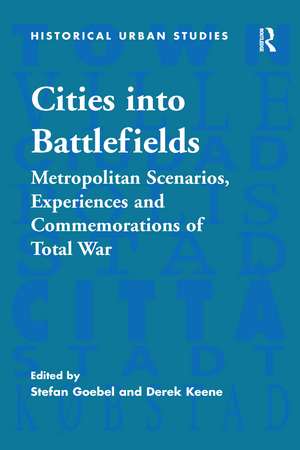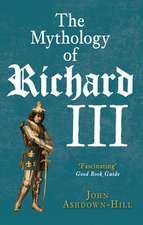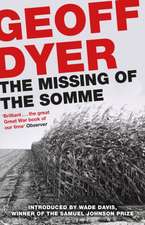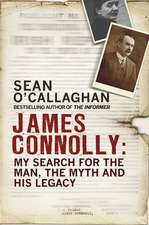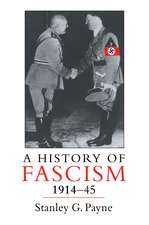Cities into Battlefields: Metropolitan Scenarios, Experiences and Commemorations of Total War: Historical Urban Studies Series
Autor Stefan Goebel Editat de Derek Keeneen Limba Engleză Paperback – 26 oct 2016
| Toate formatele și edițiile | Preț | Express |
|---|---|---|
| Paperback (1) | 469.34 lei 6-8 săpt. | |
| Taylor & Francis – 26 oct 2016 | 469.34 lei 6-8 săpt. | |
| Hardback (1) | 1059.45 lei 6-8 săpt. | |
| Taylor & Francis – sep 2011 | 1059.45 lei 6-8 săpt. |
Din seria Historical Urban Studies Series
-
 Preț: 401.92 lei
Preț: 401.92 lei - 25%
 Preț: 324.16 lei
Preț: 324.16 lei - 16%
 Preț: 338.33 lei
Preț: 338.33 lei - 16%
 Preț: 338.33 lei
Preț: 338.33 lei - 17%
 Preț: 338.33 lei
Preț: 338.33 lei -
 Preț: 469.34 lei
Preț: 469.34 lei -
 Preț: 469.34 lei
Preț: 469.34 lei - 8%
 Preț: 376.64 lei
Preț: 376.64 lei -
 Preț: 469.34 lei
Preț: 469.34 lei -
 Preț: 469.34 lei
Preț: 469.34 lei -
 Preț: 469.34 lei
Preț: 469.34 lei -
 Preț: 469.34 lei
Preț: 469.34 lei - 25%
 Preț: 324.16 lei
Preț: 324.16 lei - 16%
 Preț: 298.19 lei
Preț: 298.19 lei - 12%
 Preț: 299.52 lei
Preț: 299.52 lei - 16%
 Preț: 299.52 lei
Preț: 299.52 lei
Preț: 469.34 lei
Nou
Puncte Express: 704
Preț estimativ în valută:
89.82€ • 97.53$ • 75.45£
89.82€ • 97.53$ • 75.45£
Carte tipărită la comandă
Livrare economică 22 aprilie-06 mai
Preluare comenzi: 021 569.72.76
Specificații
ISBN-13: 9781138273252
ISBN-10: 1138273252
Pagini: 256
Dimensiuni: 156 x 234 mm
Greutate: 0.45 kg
Ediția:1
Editura: Taylor & Francis
Colecția Routledge
Seria Historical Urban Studies Series
Locul publicării:Oxford, United Kingdom
ISBN-10: 1138273252
Pagini: 256
Dimensiuni: 156 x 234 mm
Greutate: 0.45 kg
Ediția:1
Editura: Taylor & Francis
Colecția Routledge
Seria Historical Urban Studies Series
Locul publicării:Oxford, United Kingdom
Cuprins
Contents: Towards a metropolitan history of total war: an introduction, Stefan Goebel and Derek Keene; 'A promise of terror to come': air power and the destruction of cities in British imagination and experience, 1908-39, Susan R. Grayzel; '9/7', the first day of the London blitz: the context, Peter Stansky; Parisian peculiarities: the French capital in the age of total war, Patrice Higonnet; Constructing a symbol of defeat and national rejuvenation: Edirne (Adrianople) in Ottoman propaganda and writing during the Balkan Wars, Eyal Ginio; Reclaiming their city: Belgraders and the combat against Habsburg propaganda through rumours, 1915-18, Jovana Knezevic; Local space and total war: enemies in Vienna in the two world wars, Maureen Healey; Ghettos and the remaking of urban space: a comparative study of Budapest and Warsaw, Tim Cole; Total warfare in a city: Stalingrad, Berlin - and Baghdad, Antony Beevor; Commemorative cosmopolis: transnational networks of remembrance in post-war Coventry, Stefan Goebel; Memories in ruins: Hiroshima's nuclear annihilation and beyond, Lisa Yoneyama; The spirit of war remains intact: the politics of space in Tokyo and the Yasukuni shrine, Julie Higashi; Conclusion: metropolitan history and national history in the age of total war, Jay Winter; Index.
Notă biografică
Dr Stefan Goebel, University of Kent, UK and Professor Derek Keene, Institute of Historical Research, London, UK.
Recenzii
'... an innovative collection of essays that ... can be recommended to anyone with an interest in urban history, memory, or military history.' Cercles '... an interesting and diverse collection of essays.' Reviews in History 'Individually, the essays make this volume a valuable addition to the literature. They also document the growing vitality of scholarship on war and the city in the twentieth century.' German Studies Review '... interesting collection on urban dimensions of total war... this is an impressive volume. The editors’ introduction, 'Towards a Metropolitan History of Total War', is full of interest and a lengthy and richly suggestive chapter, unlike so many editorial introductions.' European History Quarterly '... impressive global reach, spanning half the globe and three continents. Rarely does a collection of essays achieve to bring together, in one volume, articles on the impact of war on such diverse places as Tokyo, Adrianople, Leningrad, Warsaw, Vienna and Coventry, to name but a few. Reading them side by side accords an impression not only of how global 'The Age of Catastrophe' (Eric Hobsbawm) really was.' Urban History
Descriere
This book explores the cultural imprint of military conflict on metropolises worldwide in the First and Second World Wars. It brings together cultural and urban historians and scholars of anthropology, education, geography, and urban planning, and examines how the emergence of 'total' warfare blurred the boundaries between home and front and transformed cities into battlefields. The central contention of this volume, that total war in the twentieth century has a significant but often overlooked metropolitan dimension, is addressed, filling a gap in the currently available literature.
